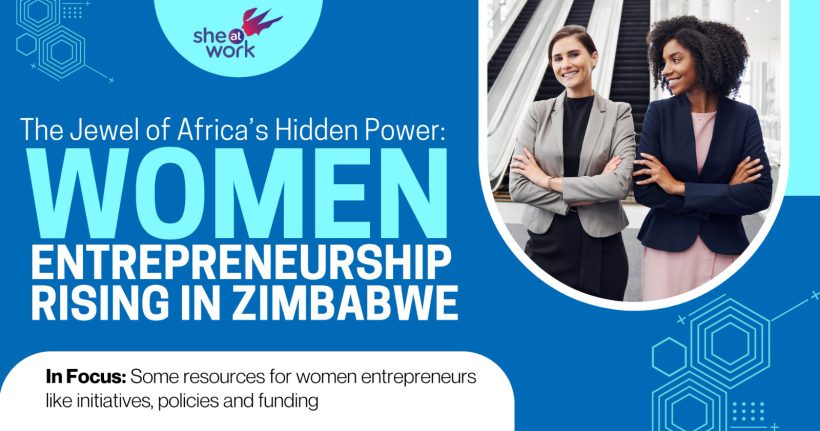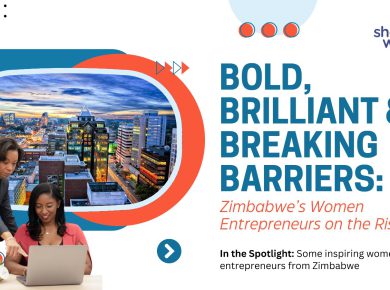In Focus: Some resources for women entrepreneurs like initiatives, policies and funding
#WomenInBusinessZW #EmpowerHerZimbabwe #SheLeadsAfrica #ZimEntrepreneurs #DigitalHeroines
Often referred to as “The Jewel of Africa” Zimbabwe is a country rich in heritage, natural beauty & entrepreneurial spirit. Among its most valuable assets are the women who drive its local economies – powering everything from bustling vegetable markets to cross-border trade routes and innovative tourism ventures. These women are bold, inventive & resilient. But, like in many parts of the world, they face a unique blend of structural hurdles and societal expectations that can make their entrepreneurial journey particularly tough.
Access to capital remains one of the biggest roadblocks – traditional lenders are hesitant, and collateral requirements are often unrealistic. Add to that limited access to training, outdated business networks, and persistent gender stereotypes, and you begin to understand the steep climb Zimbabwean women must make to get their ideas off the ground.
Turning Struggles into Startups: Zimbabwe’s Women Forge New Paths in Entrepreneurship
Yet, despite these odds, they stick on. And encouragingly, Zimbabwe is seeing a gradual shift. Government and private-sector initiatives are stepping up to provide targeted support through microfinance schemes, capacity-building programs, market access platforms, and even digital entrepreneurship accelerators.
With the country increasingly integrating into regional markets like AfCFTA and digital tools becoming more accessible, women entrepreneurs are seizing new opportunities and reimagining their business models for long-term growth. The question now is not whether Zimbabwean women are ready to lead in business – it’s whether the ecosystem will rise to meet their potential.
Now, we focus on some resources available for women entrepreneurs like initiatives, policies and funding in Zimbabwe.
- Policies in Zimbabwe
Since its independence in 1980, the promotion of gender equality has been a priority for Zimbabwe.
The Constitution of Zimbabwe (2013), Section 17, provides equal legal rights to women across all dimensions. Zimbabwe has a Revised National Gender Policy (2017) that places strong emphasis on gender equality and equity and looks out for a gender-just society in which men and women enjoy equity, and benefit as equal partners in the development of the country.
Zimbabwe has a National Development Strategy 2021-2025 (NDS 1) that aims to address economic challenges by strengthening gender mainstreaming across all sectors to promote women’s active and equal participation in the country’s economic development.
In recent years, Zimbabwe has redoubled its commitment to women’s economic empowerment, recognizing its pivotal role in achieving overarching development objectives.
To reach this objective, the Government has launched two key initiatives – aimed at bolstering gender equality and fostering women’s economic participation.
The first initiative focuses on enhancing access to financial resources and entrepreneurship opportunities for women entrepreneurs, ensuring they can access the necessary capital and support to establish and grow successful businesses.
This programme aligns closely with Vision 2030 and the National Development Strategy 1 (NDS1), seeking to harness women’s entrepreneurial potential as a driving force for sustainable economic growth and development.
The second initiative centres on promoting gender-responsive policies and institutional frameworks across all sectors of society.
By mainstreaming gender considerations into policy-making processes and institutional structures, Zimbabwe aims to create an enabling environment – where women can thrive and actively contribute to the country’s development trajectory.
These initiatives underline Zimbabwe’s unwavering commitment to advancing gender equality and women’s empowerment as indispensable pillars of its national development agenda.
- The Government Ministry
Here we refer to the section that focuses on – women affairs, community, small and medium enterprises development.
The mission is – to formulate and implement policies, strategies and programmes that promote women, gender equity and community development.
The overall functions are:
· Formulate, implement and evaluate policies, strategies and programmes that promote women, gender equity and community development.
· Develop markets and marketing systems for goods and services produced by women in consultation with other line Ministries and stakeholders.
· Promote entrepreneurial skills development for women in consultation with other line Ministries and stakeholders.
· Administer and manage the operations of the National Handcrafts Centre, the National Training Centre for Rural Women and the Roger Howman Training Center.
· Promote equal and equitable access, control and ownership of resources in order to address gender inequalities.
· Prevent and ensure total eradication of gender-based violence.
· Coordinate all research work and publications on gender and provide gender sensitive information and gender disaggregated data for use in planning and project implementation at all levels and in all sectors.
· Promote public awareness and opportunities for women development.
· Promote, coordinate and monitor innovative financing schemes for Micro, Small and Medium Enterprises (MSMEs).
· Provide, coordinate and facilitate skills, entrepreneurship and management training that support the growth of SMEs.
· Promote the formation and development of clusters, business linkages and associations for SMEs.
· Promote Business Incubation for SMEs.
· Provide support for technology access and development in the SME sector.
· Provide business consultancy services to SMEs.
· Conduct research into local and global trends to identify business opportunities for SMEs.
· Develop, maintain and update a data base of SMEs.
· Administer the SME development funds.
- ACP GENDER FINANCE FACILITY – STANBIC ZIMBABWE
This facility provides funding to Stanbic Zimbabwe – to finance limited scale projects undertaken by private sector entities, notably small and medium sized enterprises (SMEs).
The facility provides funding to Stanbic for on-lending to eligible small and medium enterprises (SMEs) and Midcaps, with a focus on women-owned or managed businesses. As such, it will tackle the long-standing credit constraints for SMEs by improving access to credit and tailoring loan terms to the specificities of women led businesses. The facility will carry longer tenors than commonly available in Zimbabwe thereby supporting Stanbic to diversify and stabilize its funding structure while ensuring final beneficiaries access financing that matches the economic life of assets financed.
The project is aligned with national, EU and EIB priorities as it aims to enhance inclusive growth and sustainable economic development in Zimbabwe – by increasing access to finance to SMEs with a specific focus on businesses run and/or managed by women. At the national level, the project responds to a number of national policies and planning frameworks including the National Development Strategy (2021-2025) which supports the integration of gender mainstreaming across all sectors and recognizes gender equality as a fundamental pillar to achieve equitable, sustainable and inclusive socio-economic development. At the EU level, the project is in line with the Multiannual Indicative Programme 2021-2027 for Zimbabwe and the Team Europe Initiative Gender Equality and Women’s Empowerment – in particular its fourth objective to “promote equality and equitable access to economic opportunities for woman and men”. It also contributes to several Sustainable Development Goals.
The aim is to enhance access to finance for SMEs, in particular those carrying out projects impacting positively on gender equality and women’s economic empowerment, in line with the 2X Challenge Criteria
https://www.eib.org/en/projects/pipelines/all/20230133
- Grants available for empowering Women’s Leadership Development Program
The Public Diplomacy (PD) section of the US Embassy Zimbabwe under the US Department of State announced an open competition for programs that strengthen women’s leadership skills & potential, while also building connections with US women in leadership positions.
The programme should expand opportunities to develop capacity in leadership styles, teambuilding, presentations & conflict management, among others.
Programme Objectives
All proposals must meet the following objectives:
o Facilitate leadership development for Zimbabwe’s women
o Address some of the major barriers to women’s leadership in Zimbabwe
o Strengthen collaboration and build networks between Zimbabwe and US leaders and organizations. Partnerships should facilitate mutually beneficial relationships, attract diverse audiences in an equitable manner, and build professional networks and an engaged citizenry in Zimbabwe.
They look for creative proposals that build real relationships, offer opportunities for hands-on leadership skills development, and offer mentorship.
- Reserve Bank of Zimbabwe
The Reserve Bank of Zimbabwe also developed an evidence-based National Financial Inclusion Strategy (NFIS) prioritizing women and women-led MSMEs financial inclusion. As part of the first phase of NFIS (NFIS I 2016-2020) they set up empowerment facilities – a seed fund that banks can access to lend to this target market.
Since the banks have discovered that women-led MSMEs repay their loans, banks are using their own funds to lend to them; and they have downscaled to offer them microfinance products.
https://globaledge.msu.edu/global-resources/resource/5732
- Academy for Women Entrepreneurs Program (AWEP)
African Women’s Entrepreneurship Program (AWEP) is an outreach, education & engagement initiative that targets African women entrepreneurs – to promote business growth, increase trade both regionally and to US markets through the African Growth and Opportunity Act (AGOA), create better business environments & empower African women entrepreneurs to become voices of change in their communities.
The Academy for Women Entrepreneurs Program (AWEP) is a US State Department initiative aimed at empowering women entrepreneurs around the world, including Zimbabwe. It provides women with the skills, resources & networks needed to start & scale their businesses. The program typically includes online training, mentorship, and opportunities to connect with other entrepreneurs.
Academy for Women Entrepreneurs Program (AWEP) provides women entrepreneurs with the skills, resources & networks needed to start and scale successful businesses. Through online courses and in person trainings, mentorship, and site visits, participants make their businesses investor ready.
Participants of the AWEP will participate in facilitated in-person and virtual sessions with established Zimbabwean and US entrepreneurs, alumni of US-funded exchange programs, and other experts from different fields that enrich the AWE program.
AWEP targets current or future women business owners in Zimbabwe. AWEP participants must commit to – complete the program, have proven computer skills, and have access to the Internet or a reliable data connection. Applicants are encouraged to develop programs for underrepresented populations, niche business sectors, or areas of potential growth.
https://zw.usembassy.gov/academy-for-women-entrepreneurs
- SEEDSTARS Enhancing Women Entrepreneurship for Africa Project
SEEDSTARS programs enhance women entrepreneurship in Africa. This project focuses on increasing the capacity and sustainability of enablers supporting Women-led Small and Medium Enterprises (WSMEs).
The objective of the Project is – to address gender inequality and inclusive economic empowerment for African women. Specifically, the Project aims at increasing the capacity and sustainability of enablers supporting Women-led Small and Medium Enterprises (WSMEs), as well as increase access to mentorship, funding and visibility for WSMEs.
The focus of their work is – to invest in the most promising entrepreneurs heading up high-growth companies in emerging and frontier markets. They support these ventures with customized and responsive programs – to help them develop profitable companies that can have a broader impact.
They are looking for WSME’s and Enablers that are operating in at least one of the following countries:
Cameroon, Democratic Republic of Congo (DRC), Kenya, Malawi, Morocco, Mozambique, Senegal, South Africa, Tanzania, Rwanda, Zambia, Ivory Coast, Ethiopia, Angola, Mali, Zimbabwe, Uganda, Botswana, Sierra Leone, Ghana, Gambia, Namibia, Cape Verde, Mauritius and Nigeria.
If you are in any of these countries, you can apply.
https://www.seedstars.com/community/entrepreneurs/programs/EWEA
- Youth Entrepreneurship and Innovation Multi-Donor Trust Fund
Since its launch in 2017, the Youth Entrepreneurship and Innovation Multi-Donor Trust Fundhas been a key catalyst for women entrepreneurs.
The fund supports the African Development Bank’s Jobs for Youth in Africa Strategy, providing grants to empower youth-led start-ups and MSMEs operating in both the formal and informal sectors.
- International Labour Organization (ILO)
Women entrepreneurs in Zimbabwe strive for a brighter future in Zimbabwe and all over the world.
A new generation of female African entrepreneurs is beginning to spring up across the continent. In Zimbabwe, an ILO project is improving living conditions of women and their families in rural areas by promoting entrepreneurship.
The International Labour Organization (ILO) is devoted to promoting social justice and internationally recognized human and labour rights, pursuing its founding mission that social justice is essential to universal and lasting peace.
The only tripartite U.N. agency, since 1919 the ILO brings together governments, employers and workers of 187 Member States, to set labour standards, develop policies and devise programmes promoting decent work for all women and men.
https://www.ilo.org/resource/article/women-entrepreneurs-zimbabwe-strive-brighter-future
- Zimbabwe Women’s Bureau (ZWB)
The Zimbabwe Women’s Bureau (ZWB) has a variety of programs focused on supporting women’s socio-economic rights and empowerment. These include initiatives related to livelihoods, sustainable agriculture, food security, environmental management, and climate change adaptation. ZWB also provides financial literacy training, business development support, and facilitates access to savings and credit cooperatives.
Zimbabwe Women’s Bureau (ZWB) is a national membership non-governmental organization that was established in 1978. Since its inception, ZWB has developed and implemented programs aimed at promoting economic sustainability, household food security and sustainable livelihoods for its members and their families throughout Zimbabwe.
Zimbabwe Women’s Bureau empowers women by facilitating access to resources, skills, and opportunities that enhance their economic independence. Through tailored training and capacity-building programs, ZWB equips women with entrepreneurial skills and technical knowledge to establish and grow small businesses, generate income & contribute to their households and communities. These initiatives focus on uplifting women and promoting self-reliance, ensuring they play a central role in economic development.
Promoting sustainable agriculture is also at the heart of their mission – to ensure household food security. They provide training on climate-smart agricultural practices, modern farming techniques, and resource management to its members. By fostering resilient farming systems, they ensure that women can produce sufficient, nutritious food while protecting natural resources for future generations, thus improving community food sovereignty.
Zimbabwe Women’s Bureau (ZWB) is a national membership non-governmental organization that was established in 1978. Since its inception, ZWB has developed and implemented programs aimed at promoting economic sustainability, household food security and sustainable livelihoods for its members and their families throughout Zimbabwe.
- Kunzwana Women’s Association
This association is involved in facilitating financial inclusion, providing practical skills training and connecting to sustainable niche markets for women and youths living in rural areas.
Kunzwana Women’s Association’s vision is to facilitate women living in rural areas to be included in all Zimbabwean developmental and economic processes.
https://www.kunzwana.co.zw/?v=31645929703e
- The Women Entrepreneurs Finance Initiative (We-Fi)
The Women Entrepreneurs Finance Initiative (We-Fi) supports women entrepreneurs – by scaling up access to financial products and services, building capacity, expanding networks, offering mentors, and providing opportunities to link with domestic and global markets.
Their mission is clearly put out. The Women Entrepreneurs Finance Initiative (We-Fi) supports women entrepreneurs by scaling up access to financial products and services, building capacity, expanding networks, offering mentors, and providing opportunities to link with domestic and global markets.
Founded in October 2017, We-Fi harnesses the public and private sectors to open new doors for women entrepreneurs across the developing world.
- Comesa Federation of Women in Business (COMFWB)
Comesa Federation of Women in Business (COMFWB) was launched in July 1993 in Zimbabwe. It is a COMESA institution which was established with the endorsement of the Authority which is made up of Heads of States and Governments of the COMESA member states.
COMFWB acts as a forum for the exchange of ideas and experience among women entrepreneurs; an instrument through which the appropriate portion of COMESA Women in Development Programmes are implemented; a forum for network among women entrepreneurs and an instrument for encouraging women to set up or expand existing enterprises.
- The allWomen.co.zw platform
In February 2025, Women’s Microfinance Bank (ZWMB) took a major step towards financial inclusion and economic empowerment for women by launching allWomen.co.zw, a digital platform designed to support female entrepreneurs.
The newly launched allWomen.co.zw platform is all set – to revolutionize the business landscape by providing women entrepreneurs with essential digital tools. The platform features:
- A central MSME database to facilitate networking and funding opportunities.
- An integrated retail payment system for seamless financial transactions.
- An online marketplace connecting female entrepreneurs with buyers.
- A 25% MSME quota to ensure women have better access to business opportunities.
- Support for digital storefronts and social media marketing helping women expand their reach.
This initiative aligns with ZWMB’s Open Space Strategy, a collaborative effort involving Co-ops Africa and government agencies to enhance financial accessibility for women. At the launch, representatives from the Reserve Bank of Zimbabwe, UN Women, and Co-ops Africa expressed their support for the platform, recognizing its potential to drive economic transformation.
https://thediplomat.co.zw/zwmb-unveils-digital-platform-to-boost-women-entrepreneurs/#










